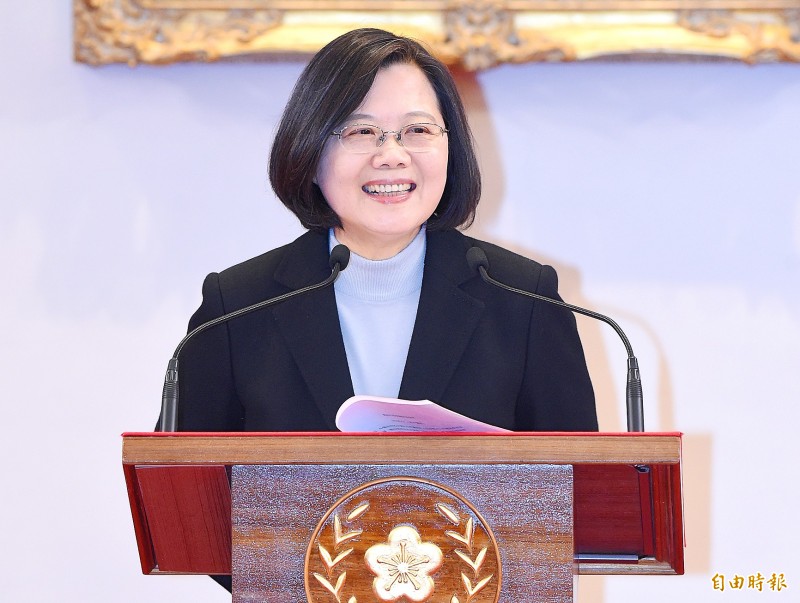《TAIPEI TIMES》 Tsai defends new law, lists 4 points

President Tsai Ing-wen smiles as she delivers her New Year’s address at the Presidential Office in Taipei yesterday. Photo: Liao Chen-huei, Taipei Times
GIVE NO GROUND: The president issued four points of common understanding, including that vigilance is urgently needed due to Chinese infiltration of Taiwan
By Su Yung-yao and William Hetherington / Staff reporter, with staff writer
The “situation in Hong Kong over the past year” has demonstrated that democracy and authoritarianism cannot coexist within the same nation, President Tsai Ing-wen (蔡英文) said yesterday in a New Year’s speech.
Responding to criticism from the Chinese Communist Party (CCP) over the legislature’s passage of the Anti-infiltration Act (反滲透法) on Tuesday, Tsai said: “Untying the bell requires the person who tied it” (解鈴還須繫鈴人) — an idiom meaning that whoever started trouble should be the one to end it.
New policies were to take effect at the start of the new year, such as an increase to the minimum wage for the fourth year in a row and improved daycare subsidies for children aged two to three, Tsai said.
There would also be tax breaks or those caring for the elderly and subsidies for farmers who purchase agricultural equipment, she said.
She thanked Premier Su Tseng-chang (蘇貞昌) for the achievements under his leadership.
Over the past year, Taiwan’s economy and stock market performed well, despite instability in the global economy, Tsai said, adding that Taiwanese businesses in China had brought operations back to Taiwan in record numbers.
China has been relentless in pressuring Taiwan to make concessions on its sovereignty, but the public has clearly expressed its unwillingness to accept Beijing’s “one country, two systems” formula, she said.
Her “four musts” on cross-strait relations, which she issued in January last year, were also a specific response to China’s encroachment on the nation, she added.
The “four musts” are that China must recognize the existence of the Republic of China; respect the values of democracy and freedom Taiwan’s 23 million people hold dear; resolve cross-strait differences in a peaceful and equitable manner; and engage in negotiations with the government of Taiwan or an institution with a mandate from the government.
Her resolve this year is even stronger, Tsai said before issuing what she called four points of common understanding: China, not Taiwan, destroyed the “status quo” in cross-strait relations; China has actively sought to hollow out the Republic of China through the so-called “1992 consensus”; sovereignty would not be traded for economic benefit; and vigilance is urgently needed in the face of Chinese infiltration of Taiwan — as well as its polarization of Taiwanese society — necessitating mechanisms to defend the nation’s democracy.
The so-called “1992 consensus” — which former Mainland Affairs Council chairman Su Chi (蘇起) in 2006 admitted making up in 2000 — refers to a tacit understanding between the Chinese Nationalist Party (KMT) and the CCP that both sides of the Taiwan Strait acknowledge there is “one China,” with each side having its own interpretation of what “China” means.
The president dispelled concerns about the Anti-infiltration Act, saying that it would not affect anyone who is not acting on behalf of the Chinese government to infiltrate Taiwanese society or institutions.
Rulings based on the act would go through proper judicial channels, Tsai said, adding that it would not affect people’s rights or freedoms, or impede those conducting business in China.
The act would serve to better safeguard Taiwan’s democratic society, she said.
“I must reiterate: It is the Anti-infiltration Act, not an ‘anti-exchange act.’ Those doing business, studying or engaging in any normal exchanges will not be affected,” Tsai said.
Asked to comment on online media start-up Master Chain’s announcement that it was withdrawing from the Taiwanese market, Tsai said that the government would not interfere with any media company or platform.
Taiwan has been among the most highly rated nations for freedom of the press in the rankings of many research organizations, including US-based Freedom House, she said.
“No upright media company operating in Taiwan would engage in illicit activity on China’s behalf,” Tsai said, adding that she hoped Taiwan’s freedom of the press would be upheld.
Taiwan is one of many nations that have enacted legislation to combat Chinese infiltration, she said, adding that it is up to China to cease such behavior.
新聞來源:TAIPEI TIMES
















